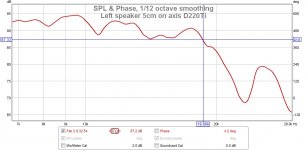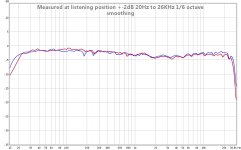I have the Selenium D220Ti in this three-way system designed by Bob Crites. Sounds excellent.
If there was a nit pick, it would have to do with the measured frequency response not quite living up to Selenium’s spec of 21 kHz.
See attached measured response.
I know, a tall order for compression drivers as there seems to be very few that make it out to 20 kHz without rolling off by more than -10 dB.
Searching around for 1” screw on compression drivers, I came across the BMS 4540nd and it specs response out to 30 kHz.
Curious to know if anyone has heard both drivers and could make a comment on SQ and extended response?
Also, if anyone has measured the BMS 4540nd and would be willing to post a graph?
Finally, any other 1” screw-on drivers that I should consider with extended HF response?
Many thanks,
Mitch
If there was a nit pick, it would have to do with the measured frequency response not quite living up to Selenium’s spec of 21 kHz.
See attached measured response.
I know, a tall order for compression drivers as there seems to be very few that make it out to 20 kHz without rolling off by more than -10 dB.
Searching around for 1” screw on compression drivers, I came across the BMS 4540nd and it specs response out to 30 kHz.
Curious to know if anyone has heard both drivers and could make a comment on SQ and extended response?
Also, if anyone has measured the BMS 4540nd and would be willing to post a graph?
Finally, any other 1” screw-on drivers that I should consider with extended HF response?
Many thanks,
Mitch
Attachments
There's certainly smoother HF extension out there than the D220ti, but I don't think the rolloff in your measurement is accurate, or at least it's not the driver's fault.
There's certainly smoother HF extension out there than the D220ti, but I don't think the rolloff in your measurement is accurate, or at least it's not the driver's fault.
Not accurate? Please explain...
I'd try to change for a better waveguide.
Check out this website: Red Spade Audio: Waveguide shootout
Then after a trick equalization good results can be achieved.
Check out this website: Red Spade Audio: Waveguide shootout
Then after a trick equalization good results can be achieved.
I would expect it to look a little less smooth at 1/12 octave smoothing, it looks like you're not using a calibrated mic, and it's really easy to lose a little bit of your frequency extremes anywhere along the chain. Do you get flat to 20kHz measurements from other speakers? What's it look like from, say 5cm straight out from the horn?Not accurate? Please explain...
Also, while I totally support using better, smoother compression drivers (although I don't know about what's going to be a good drop-in for your crossover), as far as the specific issue of 18.6kHz extension vs 20kHz extension, it's not much different. It's D10 vs D#10. It's equivalent to difference between 30Hz and 32Hz in bass extension.
Last edited:
I would expect it to look a little less smooth at 1/12 octave smoothing, it looks like you're not using a calibrated mic, and it's really easy to lose a little bit of your frequency extremes anywhere along the chain. Do you get flat to 20kHz measurements from other speakers? What's it look like from, say 5cm straight out from the horn?
Also, while I totally support using better, smoother compression drivers (although I don't know about what's going to be a good drop-in for your crossover), as far as the specific issue of 18.6kHz extension vs 20kHz extension, it's not much different. It's D10 vs D#10. It's equivalent to difference between 30Hz and 32Hz in bass extension.
Thanks. I am using a calibrated mic and have measured systems flat out 26 kHz - see attached. The electronics have been measured flat to beyond 48 kHz (using 24/96 in REW).
Attached is the D220Ti response at 5cm. Not much different.
My xover is at 5 kHz and can match whatever driver drop in within reason.
The D220Ti starts to rolloff at 18.6 kHz., whereas looking at the product graphs for the BMS 4540 rolloff at 30 kHz. That's a significant difference.
My question is has anyone heard the BMS 4540 or measured actual frequency response? Or can recommend any other 1" screw on compression driver with extended HF response? I am more interested in HF extension than smoothness for my application.
Thanks.
Attachments
I see. Most the measurements I've seen of the selenium actually have a bit of a peak around 20k, looks like break up, but I suppose they vary. Have you tried measuring the driver on the horn without crossover? Doesn't look like anyone else has (except Crites, one would hope.).
Anyway, as far as what you want, I guess ring radiators are what you're going to need.. Besides the 4540, for threaded ones, hmm... JBL 2407 or 2406? I think at least one of those is threaded. I have heard the 4550 sounding very nice, whatever that's worth. Never heard the 4540, as far as I know.
Anyway, as far as what you want, I guess ring radiators are what you're going to need.. Besides the 4540, for threaded ones, hmm... JBL 2407 or 2406? I think at least one of those is threaded. I have heard the 4550 sounding very nice, whatever that's worth. Never heard the 4540, as far as I know.
Thanks for your helpful comments. Led me to measurements: Ring Radiator Comparisons and comments.
Cheers
Cheers
Bump....
Hi there, I was asking myself the same question, but more in terms of sound quality, than in terms of frequency extension.
Any new info about D220Ti vs BMS 4540nd vs?
best,
Carlos
Hi there, I was asking myself the same question, but more in terms of sound quality, than in terms of frequency extension.
Any new info about D220Ti vs BMS 4540nd vs?
best,
Carlos
IMO going from Selenium to BMS is like jumping out of a KIA into a Porsche
🙄 you don't like Korean cars, do you?going from Selenium to BMS is just like jumping from a Hyundai into a Ferrari 😀
I am using a JBL 2407 (same driver as the 4540nd as far as I can tell) with a small 6" JBL PT waveguide (from JBL AC16) and I must say it is impressively smooth, detailed, and easy to EQ from 2kHz to beyond 20kHz. Directivity is also very coherent even past 10kHz.
This is definitely a great combo, and a perfect match for a 6" or 8" midbass driver.
Last edited:
- Status
- Not open for further replies.
- Home
- Loudspeakers
- Multi-Way
- Selenium D220Ti vs BMS 4540nd vs ?


